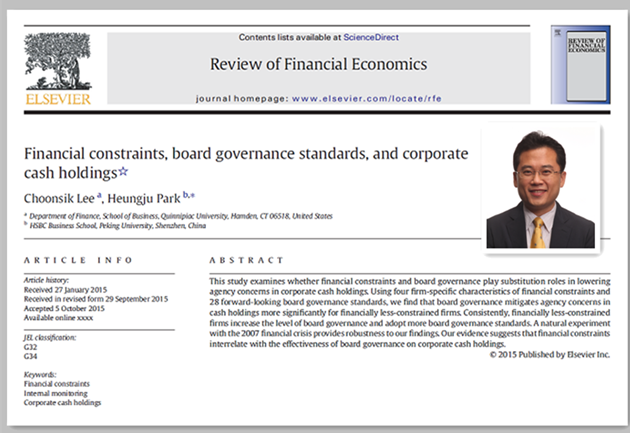The international academic journal,
Review of Financial Economics, has published research co-authored by a Peking University HSBC Business School (PHBS) faculty member. “
Financial constraints, board governance standards, and corporate cash holdings,” by Choonsik Lee of Quinnipiac University, and PHBS assistant professor
Heungju Park, analyzes 4 firm-specific characteristics of financial constraints and 28 forward-looking board governance standards.
 Choonsik Lee, Heungju Park“ Financial Constraints, Board Governance Standards, and Corporate Cash Holdings,” Review of Financial Economics Volume 28, December 2015, P 296–308
Choonsik Lee, Heungju Park“ Financial Constraints, Board Governance Standards, and Corporate Cash Holdings,” Review of Financial Economics Volume 28, December 2015, P 296–308
In fact, according to the authors, past studies have examined the importance of each governance mechanism in mitigating agency problems. They point out that agency problems emerge when the agent (corporate management) is motivated to act in their own best interests rather than those of the principals (shareholders). But not many research studies have effectively explored the direct link between governance mechanism, financial constraints and cash holdings.
The article refers to a lawsuit against Apple's management in 2013 that indicates that corporate cash holdings have received growing attention from business practitioners. It claims that Apple, one of the financially healthiest firms in the U.S, sat on overwhelmingly huge cash holdings rather than distributing it to shareholders and that its poor governance structure undermines the effective monitoring of managers. What is the reason behind Apple’s financial choice, and does it has anything to do with its governance mechanism? Researchers have been intrigued to study how governance mechanism, financial status and cash holdings interact with each other.
Professor Park’s recent paper examines a more direct causal link on this issue. He discusses that managers with limited access to the external financing market have less incentive to waste internal cash and would prefer to save the internal cash. In general, shareholders of financially constrained firms with relatively lower agency concerns allow managers to hold large amounts of cash reserves.
Instead of using any of the indices found in the previous literature, Park and his co-author use four firm-specific characteristics to measure financial constraints: annual payout ratio, firm size, bond rating, and paper rating.
In addition, they measure the board governance quality of each company based on selected governance standards, including 17 standards on board-related issues, four standards on audit related issues, six standards of progressive practices, and a standard of director education. These standards are expected to promote effective functioning of the board and are likely to increase operational and financial transparency. Compared with studies that focus on individual board governance characteristics, like board size or CEO duality, Choonsik and Park believe that their method has the advantage of measuring the total effectiveness of the board monitoring function.
This study includes two different sets of regression tests: tests of the determinants of corporate cash holdings by financial constraints and board governance and tests of the direct causal relation between financial constraints and board governance. It proves that financial constraints interrelate with the effectiveness of board governance on corporate cash holdings. Financially less-constrained firms have higher-level board governance mechanisms in place than constrained firms, and additionally, that financially less-constrained firms tend to adopt more board standards.
To address the reverse causality between financial constraints and board governance, they use the financial crisis as a natural experiment. The findings show that the role of financial constraints in reducing agency concerns related to corporate cash management drops, and board governance of financially less-constrained firms significantly reduces during the financial crisis. The reason is that even financially less-constrained firms were subject to limited external financing and had been less motivated to enhance their board governance than during the non-crisis period.
Though past studies have examined the role of governance mechanisms in mitigating agency problems, Park and Choonsik’s research proves a relation of substitutability between financial constraints and board governance with respect to corporate cash holdings. “These empirical findings also have implications for shareholder activism around the issue of corporate cash holdings,” commented Park. He said that it is beneficial for business leaders to make financial decisions and adjust board governance accordingly.
For the research paper, click read more
By Annie Jin
Edited by Priscilla Young















